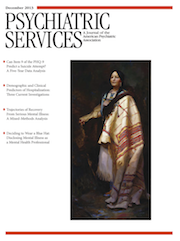Interventions to Increase Initial Appointment Attendance in Mental Health Services: A Systematic Review
Abstract
Objective
Although nonattendance at initial appointments in mental health services is a substantial problem, the phenomenon is poorly understood. This review synthesized findings of randomized controlled trials (RCTs) of interventions to increase initial appointment attendance and determined whether theories or models contributed to intervention design.
Methods
Six electronic databases were systematically searched, and reference lists of identified studies were also examined. Studies included were RCTs (including “quasi-randomized” controlled trials) that compared standard practice with an intervention to increase attendance at initial appointments in a sample of adults who had a scheduled initial appointment in a mental health or substance abuse service setting.
Results
Of 144 potentially relevant studies, 21 met inclusion criteria. These studies were reported in 20 different research papers. Of these, 16 studies (N=3,673 participants) were included in the analyses (five were excluded because they reported only nonattendance at the initial appointment). Separate analyses were conducted for each intervention type (opt-in systems, telephone reminders and prompts, orientation and reminder letters, accelerated intake, preappointment completion of psychodynamic questionnaires, and “other”). Narrative synthesis was used for analysis because the high level of heterogeneity between studies precluded a meta-analysis. The results were mixed for all types of intervention. Some isolated high-quality studies of opt-in systems, orientation and reminder letters, and more novel interventions demonstrated a beneficial effect.
Conclusions
The synthesized findings indicated that orientation and reminder letters may have a small beneficial effect. Consistent evidence for the efficacy of other types of common interventions is lacking. More novel interventions, such as asking clients to formulate plans to deal with obstacles to attendance and giving clients a choice of therapist style, showed some promise, but studies require replication.



